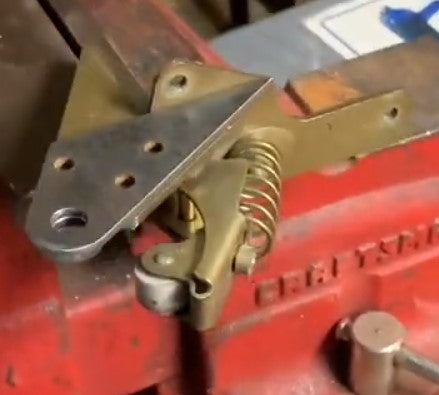There are a variety of words used to describe certain hardware, and it can get confusing fast when you're new to the game. But we've got you covered! Here are a few common terms used to describe hinges and cabinet parts.
-
Bevel: Beveled doors use a beveled hinge or sometimes an overlay hinge.
-
Butt Hinge: A common hinge type with two rectangular leaves joined by a pin, often used for doors and cabinets.
-
Cabinet Catch: Keeps the cabinet door closed. Used with non self-closing hinges.
-
Cabinet Overlay: The amount a cabinet door overlaps the frame or opening, crucial for hinge selection. To learn more about how to measure your Cabinet Overlay to choose the correct hinges, click here.
-
Concealed Hinge: A hinge installed inside the cabinet that is invisible when the door is closed.
-
Demountable Hinge: demountable doors have a slit cut in the side and a tab on the hinge that fits into it. Double demountable hinges also have a tab on the frame side, and the frame of the cabinet has a slit.
-
Face Frame Hinge: A hinge where one side is installed on the cabinet face frame.
- Face Mount or Semi-Concealed Hinge: A hinge that mounts on the outside of the cabinet frame.
-
Flush Mount: When surfaces (like a door and frame) are even with each other.
-
"H" Hinge: a type of hinge where the leaves, when open, resemble the letter "H". Often used for corner cabinets.
-
"HL" hinges: a type of cabinet hinge that features a leaf shaped like the letter "L", in addition to the traditional "H" shape. Often used for corner cabinets.
-
Inset Door: A door that is either partially or fully set into the cabinet frame.
-
Mortise: A recess cut into wood to receive a hinge leaf or lock.
-
Overlay: the amount of the face frame hidden by the door on the hinge side of the frame.

-
Overlay Door: The door of the cabinet is completely outside the cabinet frame.
-
Offset Hinge: An older style of hinge where the whole hinge is located outside both the frame and the cabinet door. Mainly made for inset doors.
-
Pilot Hole: A small hole drilled to guide a screw and prevent wood from splitting.
-
Reveal: The visible edge of a frame or door when closed.
-
Self-Closing Hinge: A hinge with a built-in spring that keeps a door closed. Installing self-closing hinges depends on the style of hinge you are using.
-
Shim: A thin piece of material used to fill small gaps for alignment.
- Soft-Close Hinges: A type of hinge that uses a damper mechanism to slow down the closing action of doors or drawers, preventing them from slamming shut. They're often used for corner cabinets.
-
Strap Hinge: A hinge with long leaves or flaps for screwing on to the surface of a door or gate. Often used for corner cabinets.
-
Pivot/Knife Hinges: A joint-like hinge made of two leaves and a small hinge pin. One part mounts to the cabinet frame or face, while the other mounts to the door.
- Wrap: The hinge wraps the frame of the cabinet.
If you're still confused or want a further description, don't fret! Give us a call! We're happy to help answer any questions you may have.






























